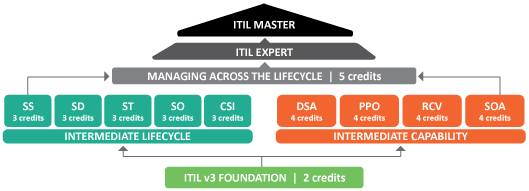ITIL Certifications
ITIL (formerly known as Information Technology Infrastructure Library) is the most widely accepted approach to IT service management. ITIL provides a cohesive set of best practices through documented, proven processes that covers the entire Service Lifecycle.
The ITIL Certification works within a modular approach to the ITIL framework, and is comprised of a series of qualifications focused on different aspects of ITIL Best Practice, to various degrees of depth and detail.

The levels of qualifications within the Certification scheme:
ITIL FOUNDATION CERTIFICATION
ITIL Foundation Certification validates a general awareness of the key elements, concepts and terminology used in the ITIL Service Lifecycle, including the links between Lifecycle stages, the processes used and their contribution to Service Management practices.ITIL INTERMEDIATE LEVEL CERTIFICATION(S)
ITIL Intermediate Level Certification(s) have a module structure with each module holding a different focal point. An individual can have as few or as many intermediate level certifications to best support their organizational requirements and their associated role.SERVICE LIFECYCLE CERTIFICATION(s)
Service Lifecycle Certification(s) are for individuals in a management or team leader role who need a broad focus of best practices to work across teams or to manage multiple capability areas.
Service Strategy Certification validates the knowledge of service strategy principles, strategy processes, governance, organizing service strategy, technology considerations, implementing service strategy, industry practices in service, challenges, success factors and risks.
Service Design Certification validates the knowledge of Service design principles, Service design processes, Service design technology-related activities, Organizing for service design, Technology considerations, Implementation and improvement of service design, Challenges, success factors and risks.
Service Transition Certification validates the knowledge of Service transition principles, Service transition processes, Managing people through service transitions, Organizing for service transition, Technology considerations, Implementing and improving service transition, challenges, success factors and risks.
Service Operation Certification validates the knowledge of Service operation principles, Service operation processes, Common service operation activities, Organizing for service operation: functions, Technology considerations, Implementation of service operation, challenges, success factors and risks.
Continual Service Improvement validates the knowledge and management techniques to coordinate all activities within this Lifecycle stage. This includes skills to continually align and realign IT services to changing business needs by identifying and implementing improvements to IT services that support business processes as they support the lifecycle approach through service strategy, service design, service transition and service operation.
SERVICE CAPABILITY CERTIFICATION(s)
Service Capability Certification(s) are for individuals looking to gain specialized, process-level knowledge in one or more process, with focus on the day-to-day execution of ITIL practices
Operational Support and Analysis certification validates the knowledge of how OSA activities support the service lifecycle, practices to optimize service operation performance, how the processes in OSA interact with other service lifecycle processes, how to use the OSA processes, activities and functions to achieve operational excellence, how to measure OSA, importance of IT security, technology and implementation considerations, challenges, critical success factors (CSFs) and risks associated with OSA.
Planning, Protection and Optimization certification validates the knowledge of processes across the service lifecycle pertaining to the practice elements within planning, protection and optimization, capacity management, availability management, IT service continuity management, information security management, planning, protection and optimization of roles and responsibilities, technology implementation considerations and organizational roles relevant to PPO.
Release, Control and Validation certification validates knowledge of the importance of service management as a practice concept and service transition principles, the importance of ITIL release, control and validation (RCV) while providing service, how all processes in ITIL RCV interact with other service lifecycle processes, what processes, activities, methods and functions are used in each of the ITIL RCV processes, using RCV to achieve operational excellence, measuring ITIL RCV, IT security and technology contributions to RCV, change management as a capability to realize successful service transition, service validation and testing as a capability to ensure the integrity and the quality of service transition, service asset and configuration management as a capability to monitor the state of service transition, knowledge management as part of enhancing the on-going management decision support and service delivery capability, request fulfilment and change evaluation to ensure meeting committed service level performance challenges, success factors and risks associated with ITIL RCV.
Service Offerings and Agreements (SOA) certification validates the knowledge of the SOA processes, understanding of return on investment (ROI), service offerings and agreements, service portfolio management, service catalogue management, Service level management, demand management, supplier management, financial management, business relationship management, SOA roles and responsibilities, technology and implementation considerations, challenges, success factors and risks.
ITIL EXPERT LEVEL
ITIL Expert Level certification candidates must achieve a minimum of 22 credits providing a balanced knowledge base across the full ITIL service lifecycle.
- hold the ITIL Foundation certificate (2 credits)
- hold 15 credits minimum from Intermediate level
- Managing Across the Lifecycle module (5 credits)
ITIL MASTER LEVEL
ITIL Master Level certification eligibility:
- hold the ITIL Expert Level certification
- worked in IT service management for at least five years in leadership, managerial, or higher management advisory levels


